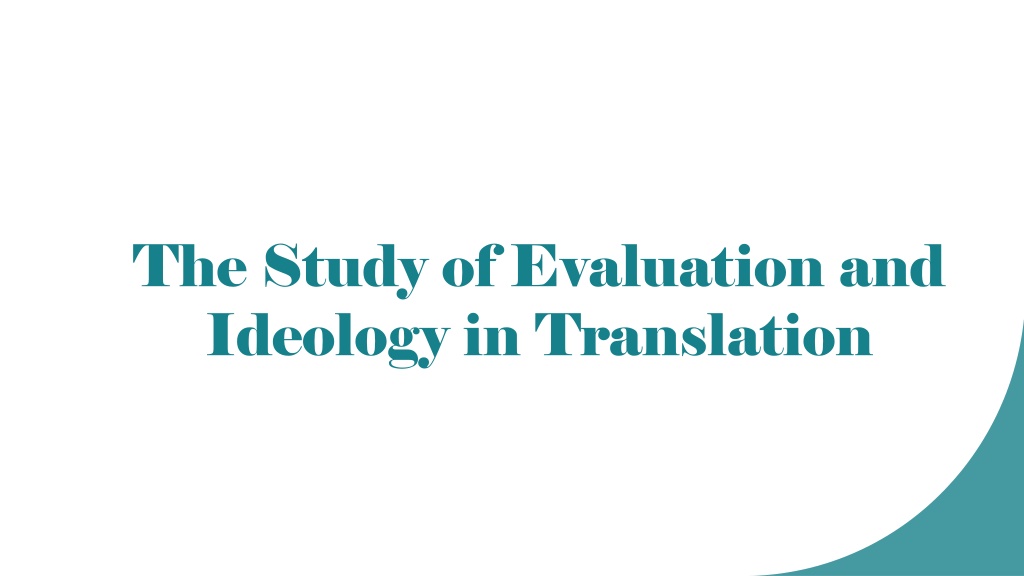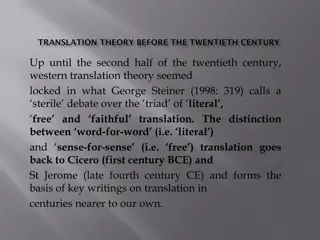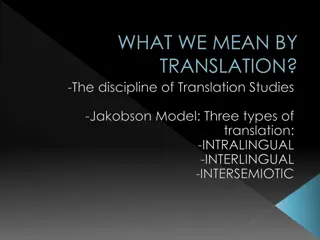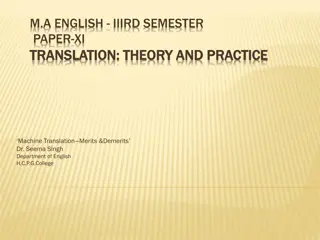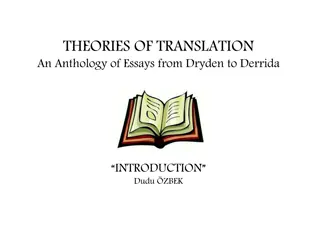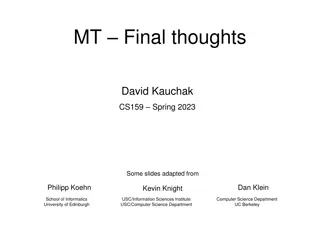Understanding Evaluation and Ideology in Translation
Evaluation plays a crucial role in the study of translation, influencing both meaning and value in communication. This evaluation is reflected through language elements like accentuation, deletion, and substitution. Appraisal, stance, and evaluation are key terms in linguistic analysis that focus on the functionality of language and the expression of attitudes. Appraisal deals with modality and attitudes, while evaluation and stance cover modality and attitudinal meaning. The importance of appraisal lies in its ability to classify affect, happiness, inclination, and security, providing detailed parameters for understanding and branching evaluations and stances.
Download Presentation

Please find below an Image/Link to download the presentation.
The content on the website is provided AS IS for your information and personal use only. It may not be sold, licensed, or shared on other websites without obtaining consent from the author. Download presentation by click this link. If you encounter any issues during the download, it is possible that the publisher has removed the file from their server.
E N D
Presentation Transcript
The Study of Evaluation and Ideology in Translation
Evaluation is an integral part of meaning. Evaluation is an integral part of meaning. Each element in a living utterance not only has a meaning Each element in a living utterance not only has a meaning but also has a value . but also has a value . Writers/speakers use language to communicate with the Writers/speakers use language to communicate with the world; to reflect these values and they world; to reflect these values and they intrude communicative situation where they express their communicative situation where they express their attitudinal attitudinal meaning or meaning or intersubjective intersubjective position. intrude into the into the position. Accentuates, deletion or substitution. Accentuates, deletion or substitution.
Evaluation, Stance, and Appraisal Evaluation , Evaluation , stance , the the most most common common terms to to refer refer to to the the linguistic share share one one common common characteristic focus focus on on the the functionality functionality of of language stance , and and appraisal appraisal are terms that that are linguistic study study of of evaluation characteristic - - that language in in use are among among currently used evaluation. . They that is, use. . are currently used They their is, their
Why Appraisal? 1 1- - appraisal deals with modality as an independent system where both, appraisal deals with modality as an independent system where both, of course in addition to mood, compose the interpersonal level of of course in addition to mood, compose the interpersonal level of meaning. (easy). It distinguishes among positive or negative attitudes meaning. (easy). It distinguishes among positive or negative attitudes towards people ( towards people ( affect affect ), their ), their behaviour behaviour ( ( judgement valuation of things ( valuation of things ( appreciation appreciation ) ) judgement ), as well as the ), as well as the 2 2- - Evaluation and stance , on the other hand, cover both modality and Evaluation and stance , on the other hand, cover both modality and attitudinal meaning (difficult) attitudinal meaning (difficult)
3 3- - appraisal appraisal provides as as affect affect , , un/happiness , un/happiness , dis/inclination dis/inclination. . provides elaborative elaborative sets which which classifies classifies in/security , in/security , sets of of parameters parameters such feelings feelings in in dis/satisfaction, dis/satisfaction, such terms terms of of and and Evaluation Evaluation and branching branching of of parameters which which the the importance) importance) can and stance stance do parameters but other other three three can be be seen seen to to relate do not but one one single, (certainty, (certainty, relate not offer single, that offer the the same same detailed that is, is, good good- -bad, expectedness, expectedness, detailed bad, to to and and
4 4- - appraisal appraisal proposes that that expresses expresses and (either (either sharpened sharpened or or softened) the the writer/speaker writer/speaker is is aligned the the subsystems subsystems respectively respectively proposes a a network and inspects inspects how softened) as aligned to to these graduation graduation network of of semantic how attitudes attitudes are as well well as these attitudes, and and semantic resources resources are amplified as how how strongly attitudes, under engagement engagement amplified strongly under
appraisal appraisal is is relevant provides provides a a set as as analyse analyse writer/speaker writer/speaker and see see how how and and why why s/he relevant to to the set of of resources resources that the study study of of ideology that can can be and translator/interpreter translator/interpreter outcomes s/he is is intruding intruding. . ideology in in the be used used to to express the way express as outcomes to to way that as well that it it well
The Appraisal Theory 1. The interpersonal in language, with the subjective presence of writers/speakers in 1. The interpersonal in language, with the subjective presence of writers/speakers in texts as they adopt stances towards both the material they present and those with texts as they adopt stances towards both the material they present and those with whom they communicate. whom they communicate. 2. How writers/speakers approve and disapprove, enthuse and abhor, applaud and 2. How writers/speakers approve and disapprove, enthuse and abhor, applaud and criticise criticise, and how they position their readers/listeners to do likewise. , and how they position their readers/listeners to do likewise. 3. The construction by texts of communities of shared feelings and values, and the 3. The construction by texts of communities of shared feelings and values, and the linguistic mechanisms for the sharing of emotions, tastes and normative linguistic mechanisms for the sharing of emotions, tastes and normative assessments. assessments. 4 4- - How writers/speakers construe for themselves particular authorial identities or How writers/speakers construe for themselves particular authorial identities or personas, how they align or dis personas, how they align or dis- -align themselves with actual or potential align themselves with actual or potential respondents, and how they construct for their texts an intended or ideal audience. respondents, and how they construct for their texts an intended or ideal audience.
How to Convey Interpersonal Meaning when when the the writer/speaker writer/speaker expresses expresses his/her attitudes, attitudes, s/he s/he shapes shapes the the features features of of his/her his/her his/her stand stand is is judged judged that that is, invited invited to to share, share, or or reject, reject, these same, same, or or an an opposite, opposite, position position. . his/her positive his/her identity the point point at at which these evaluations evaluations and positive or or negative identity from from which which recipients recipients are and occupy occupy the negative which is, the are the Taking Taking whole whole texts texts not not small small segments segments. . Appraisal Appraisal is is a a means means- -end end. . It It is is about about ideology ideology
Translators position to the text Compliant , Resistant , and Tactical Compliant , Resistant , and Tactical linguistic analysis throughout the use of appraisal semantic resources is carried out in both the source and target texts to see whether they, roughly speaking, correspond or not in terms of the ideology intended by the speaker/writer as compared to the one depicted by the translator / interpreter.
Affect AFFECT AFFECT, , it it is is fundamentally reactions reactions . . Moreover, Moreover, depending un/happiness , un/happiness , dis/inclination dis/inclination fundamentally concerned depending on dis/satisfaction , dis/satisfaction , concerned with on the the surge in/security , in/security , with emotional emotional surge of of feeling, feeling, and and
Example Mere words cannot fully express the profound feel for what our country is going through and for what members of both parties in Congress are now forced to deal with (Clinton, I am profoundly Sorry, December 11, 1998). profound remorse remorse I
Judgment JUDGEMENT, JUDGEMENT, the people s people s normality normality , , capacity veracity veracity and the second second sub behavior behavior in in capacity and and tenacity and propriety propriety sub- -type relation relation tenacity , , and type of of attitude, to to social social and social social sanction attitude, evaluates esteem esteem : : sanction : : their evaluates their their their
Example Example a a murderous tyrant murderous tyrant, who has already thousands of people thousands of people. This same East, has invaded and East, has invaded and brutally occupied other nations without warning, and other nations without warning, and holds unrelenting hostility United States (Bush, Speech to America, July 9, 2002). United States (Bush, Speech to America, July 9, 2002). , who has already used chemical weapons to kill used chemical weapons to kill . This same tyrant tyrant has tried to has tried to dominate brutally occupied a small neighbor, has a small neighbor, has struck holds unrelenting hostility towards the dominate the Middle the Middle struck towards the
Appreciation APPRECIATION APPRECIATION conveys phenomena phenomena according composition composition , , and conveys our according to to three and valuation valuation . . our estimation estimation of of things three variables, variables, which things or or natural which are are reaction natural reaction , ,
Example Example We We come come to to Berlin, duty duty to to speak speak in in this we're we're drawn drawn here history history in in this nation nation; ; by by the most most of of all, all, by Down Down this this Wall, Berlin, we this place here by by other this city, city, more the beauty beauty of of the by your your courage Wall, June June 12 we American American presidents, place of of freedom freedom. . But other things things as more than than 500 500 years the Grunewald Grunewald and courage and and determination 12, , 1987 1987) ). . presidents, because But I I must as well well: : by years older older than and the determination (Reagan, because it's must confess, confess, by the the feeling feeling of of than our the Tiergarten Tiergarten; ; (Reagan, Tear it's our our our own own Tear
In fact, the speaker/writer adopts a particular stance towards In fact, the speaker/writer adopts a particular stance towards each of the kinds of attitude set out above. These stances are each of the kinds of attitude set out above. These stances are crucially revealed to the audience using crucially revealed to the audience using lexico choices that strategically designed to drive him/her take a choices that strategically designed to drive him/her take a similar, contrary or undecided position. similar, contrary or undecided position. lexico- -grammatical grammatical
Engagement Disclaim ( denial or counter Disclaim ( denial or counter- -expectancy ). ex. expectancy ). ex. (war on terror) (war on terror) Proclaim ( concurring , pronouncement , or endorsement ), Proclaim ( concurring , pronouncement , or endorsement ), Attribute ( acknowledgement and distancing ), Attribute ( acknowledgement and distancing ), Entertain. Entertain.
Example Example This This is is not, is is not not just civilization's civilization's fight and and pluralism, pluralism, tolerance Congress, Congress, September September 20 not, however, however, just just America's America's freedom fight. . This This is is the tolerance and just America's America's fight freedom. . This the fight fight of of all and freedom 20, , 2001 2001) ). . fight. . And the world's world's fight all who who believe believe in in progress freedom (Bush, (Bush, Address And what what is is at at stake fight. . This progress Address to to stake This is is This is is the
Graduation Force and Focus; Force and Focus; Force: intensification or quantification . Force: intensification or quantification . You have You have lost too certainly certainly not lost America, for we will stand with you for not lost America, for we will stand with you for as many tomorrows tomorrows as it takes (William Jefferson Clinton, Oklahoma Bombing as it takes (William Jefferson Clinton, Oklahoma Bombing Memorial Prayer Service Address, April 23, 1995). Memorial Prayer Service Address, April 23, 1995). lost too much, but you have not lost much, but you have not lost everything everything. And you have . And you have as many
